| Srl | Item |
| 1 |
ID:
087826
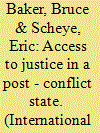

|
|
|
|
|
| Publication |
2009.
|
| Summary/Abstract |
Post-conflict governments and donors prioritize rebuilding the justice sector through state delivered rule of law and access to justice programmes. Misunderstanding the nature of the post-colonial state, such programmes make questionable assumptions. First, that a lack of access to state justice is the same as an overall absence of justice. Second, that the state system that is being built is what people want. Third, that the state system of justice that is being built could provide a sustainable nationwide network in the foreseeable future. Based on interviews conducted with policy designers, practitioners, local people and chiefs at three sites in southern Sudan 2007, this article calls for a rethinking of donor-supported justice and police development and advocates an approach that recognizes the importance of local justice.
|
|
|
|
|
|
|
|
|
|
|
|
|
|
|
|
| 2 |
ID:
087828


|
|
|
|
|
| Publication |
2009.
|
| Summary/Abstract |
While emotions are at the core of human behaviour, they have received little attention in conceptions of international policing where only 'rational' behaviour tends to be taken seriously. This blind spot is problematic, inter alia because it leads to an impoverished understanding of what contributes to the successes or failures of peace operations. This article makes a foray into this space, positing that a better understanding of the relationship between emotions (of local and intervening actors alike) and international policing performance could lead to improvements in mission design as well as implementation. The article identifies methods with the capacity to assess performance through the lens of emotion.
|
|
|
|
|
|
|
|
|
|
|
|
|
|
|
|
| 3 |
ID:
087832
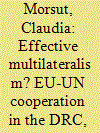

|
|
|
|
|
| Publication |
2009.
|
| Summary/Abstract |
This article examines the EU's partnership with the UN in building effective multilateralism through an analysis of the EU operations in the Democratic Republic of Congo (DRC) between 2003 and 2006. The EU has offered a range of tools in the field of civilian and military crisis management to MONUC, the UN Organization Mission in the DRC, thus representing the first case of full partnership on the ground between the two organizations. This pioneering peace operation can offer insights into possible future collaboration between the two organizations in peace and security matters. The argument of the article is that it is possible to establish a 'partner model' from the example of cooperation in the DRC: in the case of a UN deficit, the EU may intervene as supporting organization. However, since the EU is keen to be considered as an independent global actor, it seems focused on a pragmatic rather than institutionalized approach in its cooperation with the UN.
|
|
|
|
|
|
|
|
|
|
|
|
|
|
|
|
| 4 |
ID:
087831
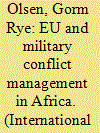

|
|
|
|
|
| Publication |
2009.
|
| Summary/Abstract |
During the 1990s, conflict prevention and conflict management became core priorities of the European Union's policy towards Africa. In the current decade, conflict management with military means has become increasingly important to the EU. The article scrutinizes the efforts of the EU to develop a military conflict management policy and it shows the dynamics and the interests lying behind the two core instruments: EU military operations within the framework of the Common Foreign and Security Polity (CFSP) / European Security and Defence Policy (ESDP) and the funding of 'African solutions to African problems'. It is the argument that development of a military conflict management policy has been and still is motivated by European concerns and European interests. Only secondly is it motivated by concerns for Africa. Because CFSP/ESDP conflict management is guided by the principle of intergovernmentalism, some member states, particularly France, exert significant influence on the EU's conflict management policy in Africa.
|
|
|
|
|
|
|
|
|
|
|
|
|
|
|
|
| 5 |
ID:
087829


|
|
|
|
|
| Publication |
2009.
|
| Summary/Abstract |
The UN peacekeeping mission in the Democratic Republic of Congo (MONUC) has been derided as one of the world's least effective peacekeeping forces. This article assesses its performance by using two indicators: mandate implementation and the reduction of human suffering. The analysis shows that effective peacekeeping in the Democratic Republic of Congo (DRC) has been hampered by two major problems. First, MONUC has had a struggle with, and inconsistent approach to, the vague concept of 'robust peacekeeping'. During key moments of the peace process, it tried to wage peace when it should have used force. Second it failed to adapt to a dynamic conflict environment. Both problems were underpinned by flawed assumptions about the peace process, the behaviour of local actors and the presumed benefits of 'post-conflict' elections.
|
|
|
|
|
|
|
|
|
|
|
|
|
|
|
|
| 6 |
ID:
087833
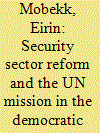

|
|
|
|
|
| Publication |
2009.
|
| Summary/Abstract |
The Democratic Republic of Congo has been plagued by continued conflict and violence in the East despite the official ending of the war. And civilians have borne the brunt of this conflict. Security sector reform (SSR) is a critical element in ensuring security, stability and sustainable peace. This article examines security sector reform conducted by the UN Mission in Congo, and also refers to other actors involved in the process, focusing primarily on the East where insecurity is prevalent due to the non-integrated Congolese forces, the Armed Forces of the DRC, other armed groups and foreign, mainly Rwandan, troops. It contends that SSR is vital to protect civilians and that thus far MONUC has not fulfilled its mandate of protection
|
|
|
|
|
|
|
|
|
|
|
|
|
|
|
|
| 7 |
ID:
087827
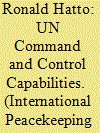

|
|
|
|
|
| Publication |
2009.
|
| Summary/Abstract |
Command and control has always been a weak point in UN peace operations. Its inefficiency was clearly demonstrated during the 1990s in both Somalia and the former Yugoslavia. This inefficiency had the effect of pushing traditional Western contributors away from UN peacekeeping. This article examines the impact of the Strategic Military Cell (SMC) established in August 2006 to supervise the UNIFIL II mission in Lebanon on its operational effectiveness, political impacts and influence on traditional contributors. The article argues that the SMC's impacts are rather minimal and that only few of its attributes will be adopted by the UN's Department of Peacekeeping Operations for other missions.
|
|
|
|
|
|
|
|
|
|
|
|
|
|
|
|
| 8 |
ID:
087830


|
|
|
|
|
| Publication |
2009.
|
| Summary/Abstract |
Western policy towards the Democratic Republic of Congo (DRC) throughout the 1996-2006 period can be understood within a realist framework. Consequently, the West has generally had a counterproductive effect on DRC internal politics. The desire to create and defend Western zones of influence in Africa had a negative impact on conflict resolution until 1997. Following this and until the setting up of a transitional government in 2003, Western inaction and neglect meant that the West was quasi-absent from the negotiations to end the war. Between 2003 and the elections of 2006, the desire to consolidate the EU as a credible actor had an impact on DRC security through the EU's support to the DRC state and to UN peacekeeping missions, but this was limited in time and space.
|
|
|
|
|
|
|
|
|
|
|
|
|
|
|
|